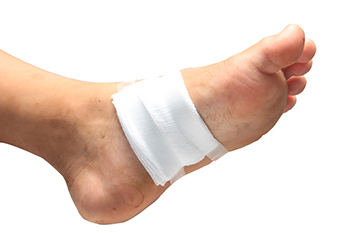

Parents have been experts on wound care for their family for many years. Bandages and antiseptic medications are standard medicine cabinet items in most houses. Certain areas of the body, such as the feet and toes, can be a bit more problematic when dealing with wounds. Any time you sustain an injury, such as a puncture wound or injury that will not stop bleeding, it is essential that you seek immediate medical help. But for other types of wounds, injuries, or sores, home care may be sufficient. For instance, in most cases, a blister on the foot will heal itself, given enough time. But if a blister pops, the risk of infection increases and protecting it with a bandage that provides cushioning is a good idea. Sores on the feet and toes can pose additional problems that can be solved with special bandages that fit odd-shaped areas. Keeping these dry and changing them regularly is essential. For any type of sore or wound on the foot that is causing increased pain or showing signs of infection, it is suggested that you visit a podiatrist.
Wound care is an important part in dealing with diabetes. If you have diabetes and a foot wound or would like more information about wound care for diabetics, consult with Dr. Stephan J. LaPointe from Georgia Foot & Ankle Specialists . Our doctor will assess your condition and provide you with quality foot and ankle treatment.
What Is Wound Care?
Wound care is the practice of taking proper care of a wound. This can range from the smallest to the largest of wounds. While everyone can benefit from proper wound care, it is much more important for diabetics. Diabetics often suffer from poor blood circulation which causes wounds to heal much slower than they would in a non-diabetic.
What Is the Importance of Wound Care?
While it may not seem apparent with small ulcers on the foot, for diabetics, any size ulcer can become infected. Diabetics often also suffer from neuropathy, or nerve loss. This means they might not even feel when they have an ulcer on their foot. If the wound becomes severely infected, amputation may be necessary. Therefore, it is of the upmost importance to properly care for any and all foot wounds.
How to Care for Wounds
The best way to care for foot wounds is to prevent them. For diabetics, this means daily inspections of the feet for any signs of abnormalities or ulcers. It is also recommended to see a podiatrist several times a year for a foot inspection. If you do have an ulcer, run the wound under water to clear dirt from the wound; then apply antibiotic ointment to the wound and cover with a bandage. Bandages should be changed daily and keeping pressure off the wound is smart. It is advised to see a podiatrist, who can keep an eye on it.
If you have any questions, please feel free to contact our office located in Rome, GA . We offer the newest diagnostic and treatment technologies for all your foot care needs.